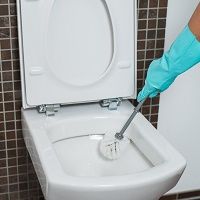Article
Which Cleaning Methods Best Eradicate C. difficile?
Author(s):
Netherland researchers compared the efficacy of 4 sporidical disinfectants, in the form of wipes and sprays. Which worked best?

Wipes are better than sprays for fighting against Clostridium difficile (C. difficile) spores, according to a June report.
Researchers from the Netherlands tested 4 sporicidal disinfectants such as wipes and sprays in order to examine their efficacy against spores of distinctive C. difficile PCR ribotypes. Because of rising C. difficile incidence in the past decade coupled with rising costs, effective infection control measures are in demand, the researchers noted.
In general, standard disinfection procedure suggests using an unbuffered 1:10 dilution of hypochlorite, which is known to lead to reduction of C. difficile.
The team first looked at hydrogen peroxide 1.5% (Aseptix Sterimax Sporicide wipes); glucoprotamin 1.5% (Incidin plus wipes); a mixture of ethanol, propane and N-alkyl amino propyl glycine (Bacillol 30 tissues); and finally, a mixture of didecyldimonium chloride, benzalkonium chloride, polyaminopropyl, biguanide and dimenthicone as active ingredients (Formula 429 spray).
The researchers purposely contaminated tiles using a test solution with the specific C. difficile strains (PCR ribotypes 010, 014 or 027). The investigators allowed the tiles to dry for an hour and then were wiped or sprayed with one of the test products, following the manufacturer’s instructions. After five minutes, microbiological cultures were performed by the study authors.
No matter the disinfection method, the researchers learned that the microbial count reduction of C. difficile PCR ribotype 010 was the highest. This was followed by reduction of C. difficile 014 and then 027. The researchers concluded that the ribotypes 014 and 027 were more difficult to eradicate than type 010.
Type 027, in particular, is known for its “hypervirulence,” the study authors wrote, compared to 010 which doesn’t produce toxins and does not actually trigger C. difficile infection in humans. Ribotype 014 is the most prevalent (17%) PCR ribotype in the Netherlands, where the study took place.
Of all the disinfection methods, the most effective was the hydrogen peroxide wipe, even beating out the hydrogen peroxide spray. Additionally, they found that wipes performed better than the sprays with the same active ingredient.
The researchers acknowledged that the argument could be made that sprays included the use of paper towels for wiping the tiles, but they cited another study which compared microfibers, cotton cloths, sponge cloths and paper towels for their decontamination abilities and did not find a significant difference.
There was a slight difference in relative light unit (RLU) reduction between the wipes and sprays, found: the wipes had a higher RLU reduction, but no significant different for RLU reduction was discovered between the 3 ribotypes.
“Impregnated cleaning/ disinfection wipes generally outperform ready-to-use sprays, even if based on the same active ingredient, and should thus be preferred over sprays for the daily cleaning/ disinfection in rooms of patients with C. difficile infection,” the researchers wrote. “Future studies should use these more resilient types of C. difficile to ensure the needed in vivo effect.”
The paper, titled “Effectiveness of various cleaning and disinfectant products on Clostridium difficile spores of PCR ribotypes 010, 014 and 027,” was published in the journal Antimicrobial Resistance & Infection Control.
Related Coverage
Calcium Could Usher In Next Breakthrough in C. difficile Treatment
Cost Appropriate Treatment with Oral Vancomycin for C. difficile Infection



